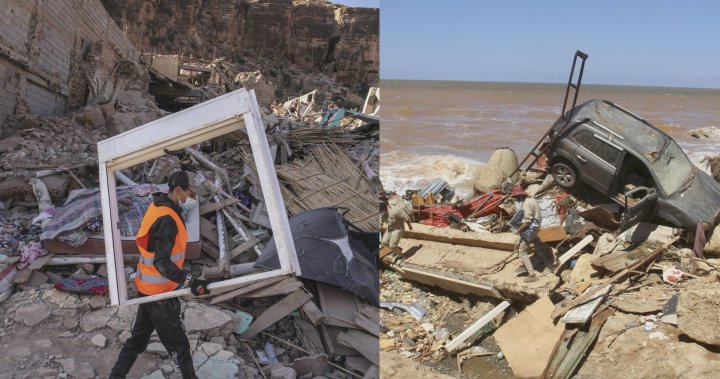
Libyan and Moroccan Canadians step up help after disasters: ‘Like family’
Global News
More than a combined 11,000 people have died following the earthquake in Morocco and flooding in Libya, with thousands more injured, missing or displaced.
As recovery efforts and work continue to assess the damage from the deadly earthquake in Morocco and devastating floods in Libya, communities in Canada are working to get supplies and aid to those impacted abroad.
This week alone, organizations like Islamic Relief Canada is hosting a fundraiser in London, Ont., on Friday to help both countries, while the Moroccan Association of Toronto (AMDT) is hosting a walk in High Park on Sunday.
Narjiss Lazrak, president of the AMDT, told Global News in an interview on Friday that the support they are providing is because while they are not here in Canada, “it’s like family.”
“If a member of the family is hurt or has an issue or problem, you have to help,” she said. “So even (if) these people are in another city, they are not close family, but we consider them family. And then we consider like they’re humans and then they need help.”
The deaths and injuries continue to mount in Morocco as more remote villages are reached by crews and bodies are dug up or people sent to hospitals. According to authorities, at least 2,901 deaths were reported as of Tuesday and it is estimated by the United Nations that 300,000 people were impacted by the magnitude 6.8 earthquake that occurred last Friday night.
In the days since, the country has limited the amount of aid allowed into the country and only green-lit crews from Spain, the United Kingdom, the United Arab Emirates and Qatar, as well as non-governmental organizations.
With Canada among the countries not able to provide direct aid, it has looked to providing help in other methods including the federal government, announcing it would match donations made to the Canadian Red Cross for up to a maximum of $3 million.
Lazrak applauded the measure, adding that while she recognizes people may want to send in physical items, it may be more difficult to know exactly what is needed and monetary donations will ensure the right needs are met.











